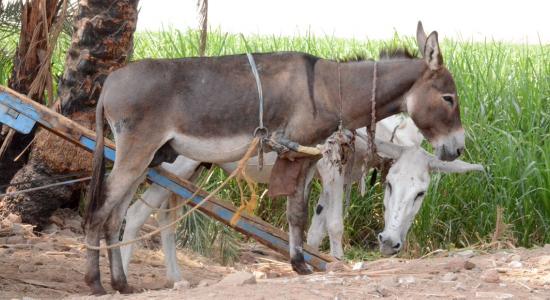The Brooke Hospital for Animals Egypt currently has 6 static clinics and one office with an inpatient capacity for 166 animals, and 25 mobile clinics going out on a daily basis to animals in their working environments. The veterinarians in these mobile teams can see up to 600 animals a day.
According to our estimates, there are 222,190 animals living in the BHA Egypt’s regional operational areas. These are working animals that need rest and good food as well as veterinary treatment, which is where the BHA teams come in: raising awareness and spreading these messages in the locations visited. These teams guarantee a unique standard of veterinary care and education to ensure that animals will have enough food, water, and shade.
During 2017 / 2018 BHA-Egypt teams helped more than 222,000 working animals in 206 locations across Egypt. They provided 276,246 treatments for working horses, donkeys and mules in the areas of operation based on BHA-Egypt clinical recording system. On average they performed 600 treatments daily, and this number is increasing yearly. As BHA Egypt currently reaches roughly 12 % of the equine population, we plan to expand our areas of activities by increasing our geographical presence in new areas.
Building the capacity of the community
Training and education;
The BHA Egypt arranges training courses for the Community Health Workers, farriers, and saddlers to become Brooke advocates and qualified local service providers in the communities where animals live and work. This is a step towards a sustainable solution to the animal’s problems by ensuring that readily-available, accessible and affordable services are provided for them.
Community Health Workers:
The BHA Egypt is working with 54 Community Health Workers in its areas of operation. Our objective is to offer animals quality medical services even when the mobile clinic is visiting elsewhere. Our staff seeks to promote the conventional delivery system by providing short-term training in general equine health care and basic husbandry techniques to people selected by the community. Their role is to:
- Disseminate general equine health care, husbandry advice, and information-acting as frontline resources.
- Offer continuous on-the-spot advice and help for animal owners/ users when their animals have any problems. They are also able to follow up the veterinarian’s advice and administer prescribed medicine orally.
- Arrange and promote community meetings and help the staff reach new communities in need of help and support from BHA Egypt.


